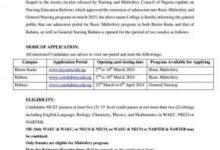How To Get Better Grades In Nigerian Higher Institutions
Getting good grades in the university is a thing of joy, most if not all student aspire for it but the funny part is that only few attain that height and the few who attain that height are not because they are the only ones who know the secret, but it is mostly because they work according to the laid down principles of the secret.
In Nigeria it is mostly likely that a good grade will not only make easy the future but most likely assures the future. Despite the odd saying that there is no job, an intelligent graduate who has acquired good grades would know were he or she would get themselves involved in to make a good living.
👉 Relocate to Canada Today!
Live, Study and Work in Canada. No Payment is Required! Hurry Now click here to Apply >> Immigrate to Canada
It is true that our educational system is nothing to write about in most part of Nigeria. Most people would say they did not attain a good primary or secondary school education, yes this might be true but your past does not have any right to affect or determine your future. It is never too late to start and pick up to amend the mistake done at the foundation of your educational history.
Our destiny is determined by our self and crowned with Gods blessing to make it a reality. The little effort we make towards our success counts no matter how little they seem to be.
Below are the steps to take in other to achieve a better grade in our Nigerian higher institutions:
1. Attend All Your Classes
Now, you might think this was an obvious one. But I speak from experience when I say that many students skip classes for one reason or another. But if you want good grades, there are several reasons why you should attend all your classes:
Absorb classroom material. Even if the lecturer follows the textbook pretty closely, sitting in the classroom and listening to the lectures/discussions will help you absorb the materials.
Make presence known/participate. One of the benefits of going to higher institution should be that you form a mentoring relationship with some of your lectures, and that’s not going to happen if you don’t attend the classes.
And often faculty have participation points (attendance marks), so beyond just attending, make an effort to be involved in the class discussions.
Earn attendance points. Many lecturers have attendance policies, so you can have a direct impact on your grade simply by attending.
👉 Relocate to Canada Today!
Live, Study and Work in Canada. No Payment is Required! Hurry Now click here to Apply >> Immigrate to CanadaDon’t forget to sit close to the front — historically, those who do are usually the best students.
2. Reframe your Attitude
The majority of university students go through university with the perception that fun and freedom are as equal in the “university” experience as studying.
I believe that every effort made to study has an impact even if not notice immediately.In essence that’s basically it. If you intend to get good grades, or to improve the ones you have, get your head straight and realize that study and fun are not a 50-50 concept.
3. Use Time Wisely
Even if you do not procrastinate and are the most organized person in the world, time can be one of your biggest enemies in the university. Here are some tips for using time wisely:
Tackle harder work first: tackle the harder stuff first so that you are sure to have enough time to complete it. You’ll feel a greater sense of accomplishment completing the work in this order.
Take breaks as reward for work. Reward yourself for completing a major task by taking a break and chatting with a friend or watching some television.
Not only are the breaks good motivation to help you complete something, you’ll also be more refreshed to tackle the next bit of work after a break.
Break larger projects into smaller, easy-to-accomplish pieces. If you have a massive term paper due at the end of the semester, break up the work into smaller chunks and assign deadlines to each part.
Do not overextend yourself; learn to say no. Besides all your academic work, you will also be asked to get involved in all sorts of clubs and organizations while in college — and at some point, you will have to learn to say no to some requests of your time.
Work hard to play hard.
4. Get the Readings Done on Time
with a personal experience I observed that reading done in advance pays you more with the following reason:
a. You read to understand, most student read only to pass their exam which of cause does not benefit their academic life.The sole aim of going to school is to read and understand not to cram words with hopes to paste them back to the lecture.
b. reading in advance easy the task of spending too many precious time on a particular course,as this would save you more time to practice other courses to better prepare for your exams.
5. Get a vivid note during class and do your assignment
I could remember my HOD would always give us assignment to solve not telling us that we would get almost same question in the exam,surprisingly we would find almost all the calculation solved during class in the exam question
Class notes are vital clues to what the lecture thinks is the most important material for you to learn, so besides taking notes, learn how to better use them to your advantage. Here are some specifics:
Be an active listener in class. Don’t read the newspaper, gossips with friends, or text your roommate during class. Instead, listen attentively and actively — and ask for clarification when you need it.
Take good notes in class. Whether taking notes from scratch or following the lectures outline, the key for you will be to get the most important details down so that you can refer back to them when you need them.
Rewrite or organize notes on outside the class. This suggestion may sound a little extreme, but the writing-to-learn literature shows that you can increase your understanding and retention of material by rewriting it.
6. Make proper use of Past Question
Past questions on every course are often a very good starting point to know your lecturers. Having past question on each subject help you to know the lecturer pattern of question, thereby helping you to prepare along that line.
Can I tell you something? Most lazy lecturer often repeat past questions from time to time, so if you have the past questions before the exam time you know what that mean.
Having past question however does not mean you should limit yourself to it, rather let it give you an overview of the subject.
Once you have prepare for the exam test yourself with the exam questions timing yourself as if you are in exam hall, with this you have adequate knowledge on the best approach for each exam.
Remember also, to study past question with your friends, or study group let everyone contribute on the best approach to tackle the question. With this your knowledge of the subject is widen.
7. Talk to the lecturer
If I could give a person one piece of advice to succeed in university, it would be to talk in advance to the person who marks your work. It is so important – its like guessing what kind of present someone wants as opposed to just asking them!
Always schedule an appointment with your lecturer.come prepared with some ideas/questions, and you will find them to be a resource of great help.
Consider your meeting with your lecturer a permanent appointment rather than something you can cancel, otherwise it will be easy to change your mind because you couldn’t come up with anything to discuss. The purpose of the appointment is to force you to think about the paper in advance.
8. Consider a Study Group
Although planning/putting a study group together can be work, they can be incredibly beneficial.
Working with like-minded, hard working people can help you connect with the readings and lectures better, and can ensure you don’t miss any concepts or better, learn a new way to approach the concepts so that everything is clear at the end.
If you know someone who can help you in a study group, really use that time effectively: students often comment that they retain more from the study group than memorizing on their own, and that when it comes to discussion/essay questions (rather than multiple choice or short answer), the study group helps to better critically analyze ideas.
9. Use your Weekends More Effectively
Students often let their weekends dwindle away – particularly a day off like Friday or Monday. Your weekend should always be a catch-up time rather than a party time.
While you may have commitments you can’t avoid, remember that if your fun time adds up to more than 15% of your weekend time, then you can mentally decrease your paper or exam mark by 25%. I know it sounds harsh (you would think I would say 40% fun time is too much), but it isn’t.
Unless you are a genius or even naturally smart and school comes easily for you, expect to work hard if you want 80+ in all your courses.
In a three-day weekend (with Friday or Monday off), I would say an evening off would be fine, but any more than that, and I think it becomes easy to let the whole weekend slip away.
10. Stop Fooling Around
We thought we ought to hammer it more Stop Fooling Around! Stop Fooling Around!!!
These are NOT the best years of your life, so please, celebrating these years like the next 50 will be a disaster. University is prepping you for life – and doing poorly in school, or being on academic probation/dropping out isn’t going to help.
If you want to be treated like a grown-up, you have to act like one. It is hard for people to take you seriously when you spend a lot of time fooling around.
When you have a busy week ahead, do not waste your time going on dates or lounging about put a clamp on your libido, and recognize that your brain should always take precedence over your nether-regions.
11. Hang Out with the Right Crowd and Learn From Others
Ask yourself – how many of my friends are partying it up, and how many are working hard? Am I surrounding myself with people I want to be like, or people I have a good time with but who don’t motivate me to study?
It is so fabulous to have friends from all walks of life and I encourage that highly, but when you are in school, you need to be around people who are working hard.
It rubs off on you a little easier, and you can learn from others. If you have a friend who seems to be doing well in school, ask them for some tips, and emulate their example.
Think of it this way: Studying can be a bit like dieting – it is a little hard to commit to initially, but having a buddy makes it 100 times easier.
If you really want to change your ways, it is about making a commitment, and being around others who make it easier, rather than harder, to keep that commitment.
12. Attend tutorials class after lectures
This is the very helpful place were you can speak out your ideas and ask questions to cover up your academic background where you missed it during secondary school.
During my university days (NATIONAL DIPLOMA) I remember attending class on course they were pretty difficult to understand and it made those courses very easy for me to understand,during exam I came out with AB in the course. some of this class may require payment but I tell you from experience it is Worth the pay so go for it.
13. Remember it is never too late
Somehow, when people get close to graduating, they kind of give up in frustration.
Never give up: learning proper study skills will not only help you this year – still 25% of your university career left! – but it will provide you with skills for graduate school, and life.








